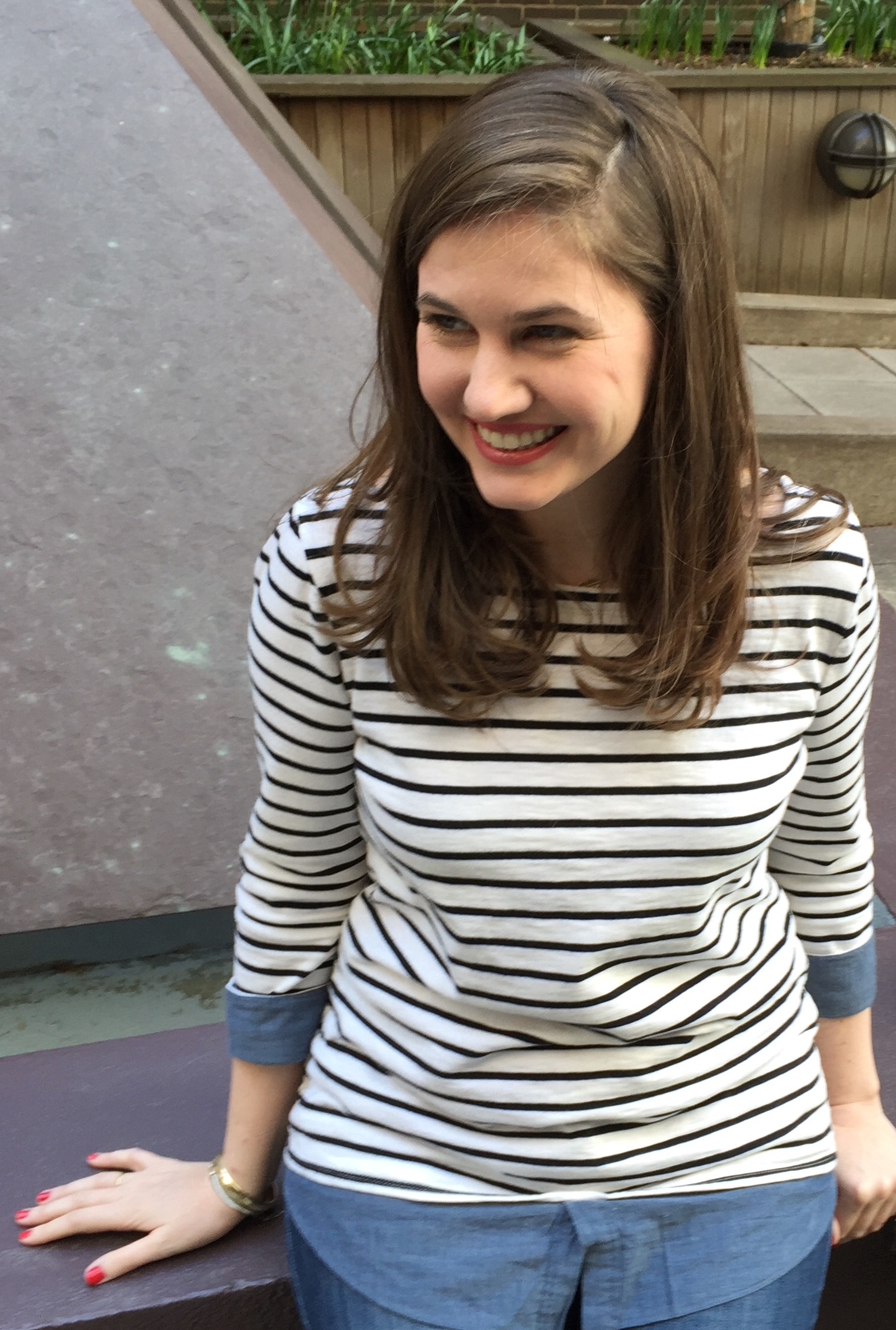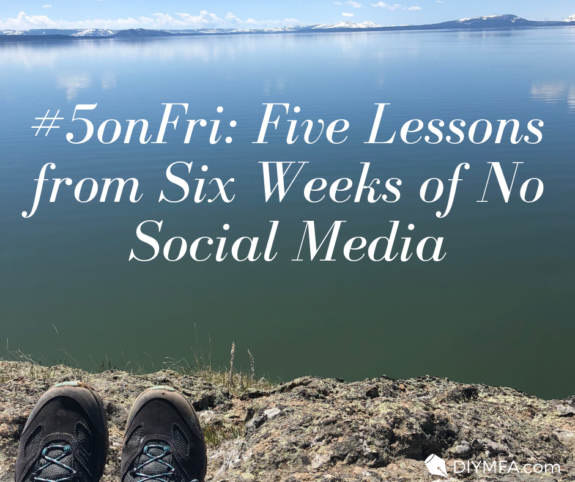I have a love/hate relationship with social media. Who doesn’t? I love the aesthetic prettiness of Instagram, and taking pictures of coffee and books. I love that I can keep up with people from high school and college on Facebook. I love reading the minute-by-minute quips of my favorite thought leaders and writers on Twitter. And dog videos. And memes. And dammit I have spent hours watching Honest Trailers and I don’t care who knows it.
But I am also aware that it has a growing–and not necessarily positive–effect on my life. More often than not, a quick check on Instagram turns into half an hour of scrolling. Or a dip into Twitter sends me into an anxiety spiral. I have found myself inspecting my own Instagram feed just to make sure I’m showing people the side of me I want them to see.
Have you ever looked up and seen that everyone is looking down at their phones? Maybe they’re all doing something useful and I’m the only one screwing around or checking my email for no reason. But ever since I started reading a book on my train commute, which required me to stash my phone away, I started noticing it. And I started noticing something about myself—I have trouble being bored.
Being bored, for a writer, is a beautiful thing. Bored is the place of story sparks and plot bunnies. Bored is subconscious brainstorming. Bored is space to let your brain breathe, and think, and create. I crave that space, but then have trouble sitting in it. So I check Instagram. Or email. Or whatever is available.
On the other hand, social media is also a great place to meet people, have conversations, and learn new things. I wasn’t quite sure I was ready to give it all up, but I did want to examine my relationship with it. So, I decided to take six weeks off.
Here’s what I learned:
1) It’s Easy to Fall Out of the Social Media Habit
I think this was the most surprising thing: how quickly I stopped caring. In the book The Power of Habit, Charles Duhigg says we’re all programmed with habit loops. There’s a trigger that compels you to start the habit, you do the habit, and then you receive a reward. For social media, my trigger is usually that I’m bored, or doing a difficult task. So I feel myself itching to check my phone, or open a browser. My brain is craving is something shiny and new. A distraction. That’s why every social media app has notifications. Just seeing that little red bubble releases dopamine in our brains. We’re all addicted to it.
But when you starve the brain of that option, you quickly—and I mean very quickly—form a new habit. Because you can’t check Facebook or whatever, there’s no reward. So you just stop doing it. It made me realize: maybe I don’t love it as much as I thought I did. Maybe what I was really craving wasn’t what social media was delivering.
So, what could I replace it with?
2) Taking Stock Allows You To Take Back Your Time (And we have more of it than we realize)
As I was searching for something to replace my social-media-when-bored-or-stressed habit, I hit on one that provided a myriad of benefits. It’s a version of Time Tracking. But, instead of just writing down what I’m doing, I write down everything I’m thinking, too. I have an Evernote document for each week. When I’m feeling bored or stuck, instead of switching to Twitter, I switch to that Evernote note, write the time, and talk it out.
In The Organized Mind, Daniel J. Levitin talks about how the act of writing things down allows our brain to stop worrying about them. You’re delegating it to your future self, so your present self can focus on the task at hand. This time tracking system allows me to do that.
Here’s an example, from this week: “Working on an email about X. I’m finding it really hard to say what I want to say, and it’s starting to stress me out. Also I have six unread emails now. That’s probably stressing me out, too, subconsciously. Maybe I’ll work on this draft email in a Word Document, and sign out of my inbox. That’ll help me focus, and get this email done, since it’s more important than the six that just came in. I will schedule a thirty minute time block to clean out my inbox at the end of the day.”
That’s just a sample. But it’s a quick way for me to work through what I’m working on, why it’s not working at the moment, and come up with a solution. As I’ve continued with this habit, I’ve naturally fallen into a healthier work rhythm. And realizing that I can get a lot done when I just concentrate on one thing. I’m constantly asking myself is “Is this urgent, or important?” and thinking more long-term about how I’m spending the short term. After all, how we spend our days is how we spend our lives. Being aware of what I’m doing helps me spend mine more wisely.
3) It’s Easy to Fall Back Into the Social Media Habit
Even with this new system, at one point, I accidentally signed back into Instagram. As it turns out, Instagram will only let you deactivate your account once a week. So I had Instagram for the next seven days, whether or not I wanted it.
And like clockwork, I was back to checking it. I didn’t post anything, although I may have snuck in a few “Likes” here and there. I wasn’t producing content and was still technically on a break (Rachel, not Ross’s view of it, I guess). But was it really a break if I fell right back into checking it?
That’s the tricky thing about habits. Duhigg says you can’t ever really get rid of them. It’s a pattern forever embedded in our brains. I was thinking, “Well that must be wrong. I’ve broken this habit!” But I hadn’t, really.
It made me realize I couldn’t just take a break from social media and expect to go back to it free of the addiction to it. Which begged the question: was it worth returning to?
4) Asking “Why” is Definitely Worthwhile
In his book Deep Work and his forthcoming book Digital Minimalism, Cal Newport advocates not being on social media at all. In Deep Work, he uses the specific example of an author to illustrate how the costs of social media—being more distracted, stressed, wasting time, etc.—outweigh the potential benefits which, for an author, are marketing and building relationships. There’s a debate to be had there. Is the best use of my limited, precious time social media, or working on improving my craft? After all, isn’t writing excellent books the best thing I can do for my career? On the other hand, there is a thriving online community of readers and writers that are reachable via social media. Bookstagram is a very lovely corner of the internet.
I’m not coming down hard on one side or the other–this is a personal decision. But at this point, I was open to entertaining the idea of making my break permanent. So, I re-evaluated my reasons. I asked myself what I hoped to gain or accomplish by using social media. For everyone, this answer is different. It may just be staying connected to your friends from high school. Or, for a writer, it may be building a brand and relationships with readers. You may enjoy finding book recommendations, or fan art, or recipes. But having a clear understanding of why I was consuming and creating content allowed me to make a measured decision about the amount of time I was devoting to it–if any.
For me, I re-framed social media in my brain, calling it, instead, Social Storytelling. Storytelling is a communal pursuit. It’s something I love to do. I started to look at Instagram as a way to tell my story, talk about writing, editing, books, and figuring out how to be a creative in a chaotic world—and to build relationships with people who are interested in those things, too. I don’t know if it will generate book sales. When I thought about my own reasons, that wasn’t really one of them. Obviously I would like to sell my books someday, but social media doesn’t provide a clear path to doing that. Realizing that relieved the pressure. And it helped me to come up with a plan.
I spend half an hour, three times a week, on social media. I’ve set up blockers on my browser with this scheduled into them. I draft all my content outside the app. And I don’t keep the app on my phone. Instead, if I want to post to Instagram, I re-download it, and post when I have time to respond to comments. I keep scrolling to a productive, enjoyable, twenty minute work break three times a week
This may be more extreme than you need. But six weeks afforded me time to get to know myself better. And I know now that, when I have the option, I’ll exercise it. So I set up my digital tools to accommodate that.
5) Twitter Will Delete Your Account After Thirty Days
This was news to me. I tried to sign back into Twitter after the six weeks, only to discover that my account was entirely gone. Wiped off the earth. As it if had never been. All my quips! All my .gifs! That one one-line Wednesday post that was so well received! In an instant, I had zero followers, zero lists, nothing. I had a moment of sheer panic. And then it passed. I realized there was nothing I could do about it. Literally nothing. And Twitter is not my life.
And this got me to think — what would be devastating if it was deleted, all in a moment? My Instagram captions? No, though that would make me very upset. My articles? Yeah, that would suck. My emails? From a practical standpoint, that would very bad. But my books? That’s what would wreck me. All in a second, it was easy to see what work I valued most.
If my books are the most important thing I create, shouldn’t I be spending the most time on them — and activities that will help me improve my craft? And what does that entail? Well, writing of course. But also reading. And thinking. And yes, boredom.
Virginia Wolfe famously said that a writer needs “A Room of One’s Own.” Having lived in the living room of an apartment with two roommates, a cat, and a wolf hybrid (no joke) for two years, I know what the value of a room of one’s own is. It’s not a window or a desk or a really pretty writing setup. It’s a door. It’s the ability to shut the world out.
Because we’re online, hooked up to our phones, all the time, we don’t have clear doors for our minds. I believe that is one of the reasons we are all so stressed out. But after taking the time away from social media, evaluating why and how I was using it, I felt empowered to create doors for myself. And I’m never going back.
Although I did get another Twitter account . . .
How do you manage social media as a creative? Let me know in the comments, or on Instagram!








